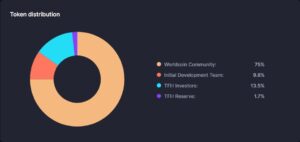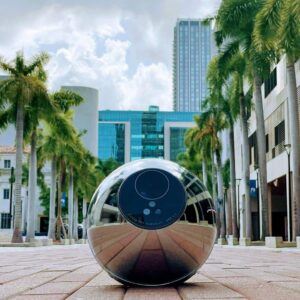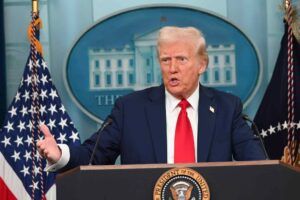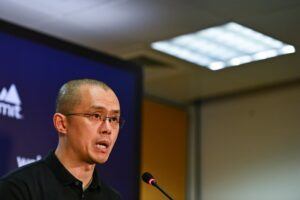Worldcoin (WLD) has been public since July 24, 2023, and is already making big waves. But what exactly is Worldcoin? How the token should lead us to a fairer world, but could possibly become the instrument of a totalitarian dystopia.
Who is behind WLD?
The crypto project was founded in 2019 by Sam Altman, Alex Blania and Max Novendstern. It received $125 million in start-up capital from various companies. The venture capital firm Andreessen Horowitz (a16z) is the main sponsor of Worldcoin.
Worldcoin itself is based in Berlin and is closely associated with Tools For Humanity, based in San Francisco. In addition, there is a non-profit organization called the Worldcoin Foundation, which is registered in the Swiss canton of Zug. Zug is the most important location for crypto foundations in the world.
What Problem is Worldcoin Supposed to Solve?
Worldcoin wants to provide an effective way to distinguish between bots and real people on the Internet. This is intended to reduce the influence of bots. Their access to certain areas of the Internet could generally be prevented, according to the plan.
This idea could be particularly influential in Web3. DeFi protocols could prevent automated actions by bots by excluding them. Financial damage is repeatedly caused in this area of the crypto market, as bots carry out sandwich attacks, for example.
A World ID can potentially prevent bots from participating in trades. Whether this plan will ultimately succeed is controversial – also because critics expect the digital identity to be traded on the black market.
The provision of personal data or an identity document is not necessary to create a World ID. Around two billion people who do not have a passport could therefore still register.
What is the Benefit of the Worldcoin Token (WLD)?
Worldcoin has its own token called WLD. Initially, this started as ERC-20 on Ethereum, but now exists predominantly on the scaling solution Optimism, which allows faster transactions at lower fees. The developers rarely speak about the purpose of the Worldcoin Token and only superficially.
WLD is intended to serve as a digital means of payment and is paid to every user at regular intervals who has a World ID. The token is managed non-custodial in its own wallet called World App, which is available for Android and iOS.
The creation of the digital identity does not depend on the cryptocurrency WLD. Why the developers nevertheless decided to create their own token, they explain in the Worldcoin Whitepaper as follows:
This is particularly important in the initial phase to start the network and bypass the “cold start problem”.
Worldcoin wants to use the WLD to create an incentive for users to drive registrations. In addition, investments were processed via the cryptocurrency and the operators are equipped with their own share in order to profit from the possible success of the project.
Further benefits should arise from the growth of an ecosystem. “Network effects will ultimately result from useful applications that build on the financial and identity infrastructure”, according to Worldcoin.
Worldcoin also has the goal of eventually handing over the management of the project to the user community. This step would require the creation of a governance token – the use of WLD in this sense is obvious.

Why Critics Warn of a Totalitarian Dystopia
Critics warn of a totalitarian dystopia in connection with Worldcoin. The problem: In order to obtain the central object behind the project – the World ID – users must allow the recording of biometric data.
Scanners placed in major cities – so-called orbs – record the iris of voluntary users. The images are then processed in the device, creating an Iris Code. This Iris Code is unique and can only be reproduced by re-recording the same eye.
This makes it possible to exclude multiple registrations. After extensive tests in developing and emerging countries, this concept is fully functional, according to Worldcoin.
The necessary device – the Orb – is developed by Tools For Humanity and produced in the Franconian city of Erlangen. Worldcoin addressed criticism of centralization and promised that similar devices could be produced by third parties in the future.
According to Worldcoin, asymmetric cryptography is used to create the Iris Code. According to this, the code itself cannot be used to find out what the exact iris of the user looks like. This is how they want to prevent abuse.
However, critics suspect that abuse is possible. They believe that access by unauthorized persons – such as hackers – would be an enormous risk for registered users. In addition, there is a risk of a totalitarian dystopia if governments take advantage of the data collected.
Worldcoin currently has only around two million users, but the goal is to register several billion people. In the past, MIT also accused the company of unfair methods – such as recording further data apart from the iris.
Why Does WLD Provide an Unconditional Basic Income?
In addition to the creation of digital identities, Worldcoin is pursuing a second major goal. The creators speak of a “global alignment”. They want to distribute global prosperity and provide an unconditional basic income with the help of the WLD.
This goal was set because a “coming technological prosperity” is to be expected. It should come as no surprise that Worldcoin is the one talking about this vision of the future.
Sam Altman founded the project together with Alex Blania. Three years after its founding, Altman gained widespread recognition as CEO and co-founder of OpenAI – the operator of the well-known artificial intelligence ChatGPT.
Buy Worldcoin Now
Bitvavo, one of the leading exchanges from Europe (Netherlands) with a large selection of cryptocurrencies. PayPal deposit possible. For a limited time only: €26 bonus when you sign up via CoinPro.ch
How Can I Find an Orb Nearby?
Interested parties can find an Orb near their own location within the World App. In addition, Worldcoin also provides an overview of available Orbs on its own website.
There are currently two of the devices in Germany – in the Alexa shopping center in Berlin and in the h5 shopping center in Erlangen. The Orb located in h5 is currently the closest from Switzerland. There is currently no Orb in Switzerland itself.
The network of orbs is to be significantly expanded in the future. Worldcoin also wants to find independent partners to operate their own orbs. Registrations are possible on the website.
Worldcoin Germany, based in Berlin, considers Germany to be its most important market. The regulations regarding the handling of personal data are particularly strict here. Society is also particularly critical when it comes to its own privacy.
According to the market manager for Germany, Friederike Lumbroso-Baumgartner, the idea is simple: if you are successful in Germany, you can also achieve this success in any other country.

This is how the Crypto Scene Reacts to Worldcoin
Worldcoin is very controversial in the crypto scene. The handling of identifying data and personal privacy enjoys special caution here. Nevertheless, the project is not entirely unpopular.
On the one hand, according to data from CoinGecko, the WLD token reached 133rd place in terms of market capitalization with a value of 288 million US dollars five days after its launch. On the other hand, well-known names in the scene expressed themselves partly as supporters.
Ethereum inventor Vitalik Buterin was convinced by the idea. He believes that digital identities are necessary to reduce the influence of institutions on the Internet. However, he could not answer whether Worldcoin is the ultimate solution.
Bitvavo, one of the leading exchanges from Europe (Netherlands) with a large selection of cryptocurrencies. PayPal deposit possible. For a limited time only: €26 bonus when you sign up via CoinPro.ch




